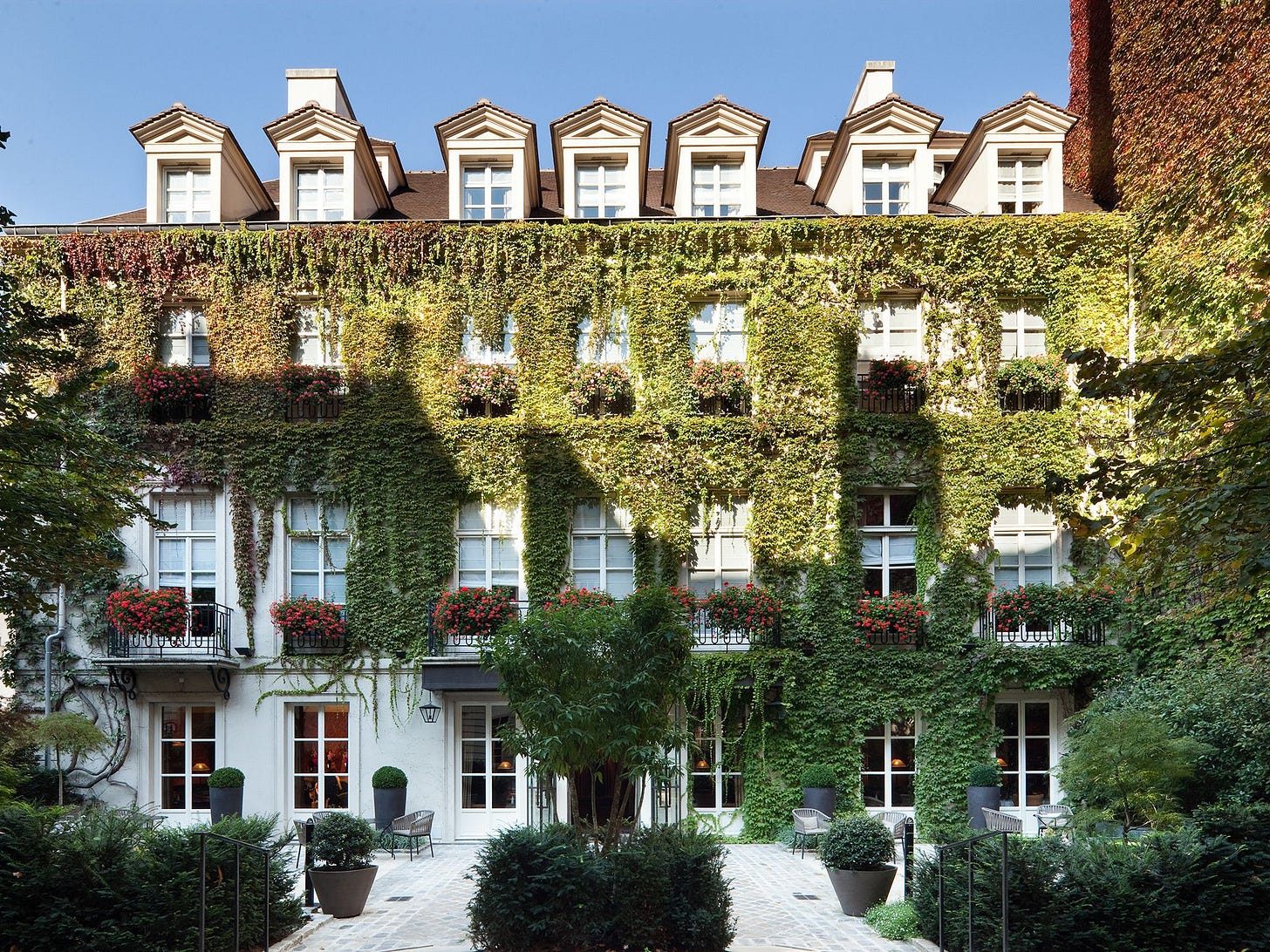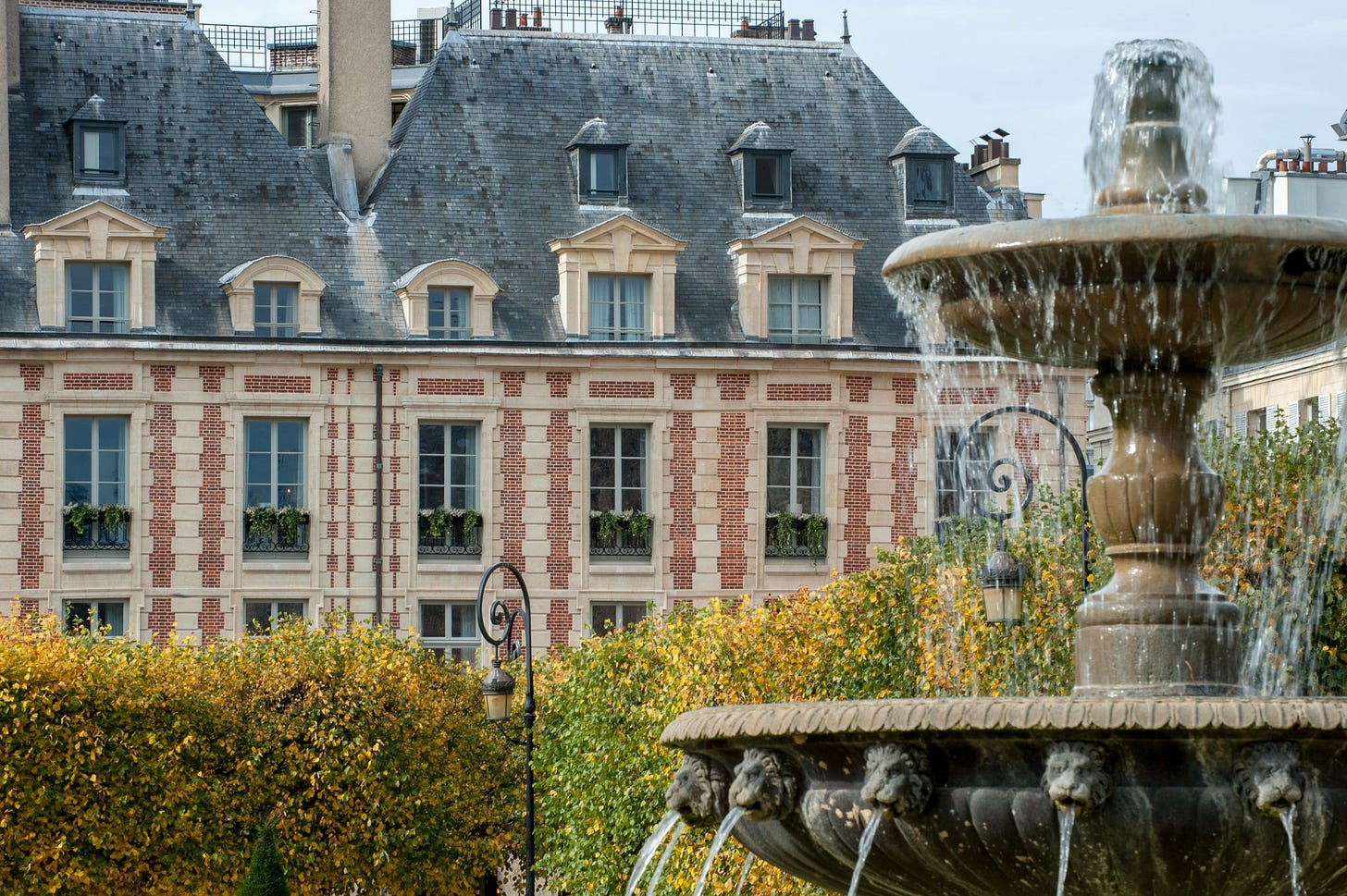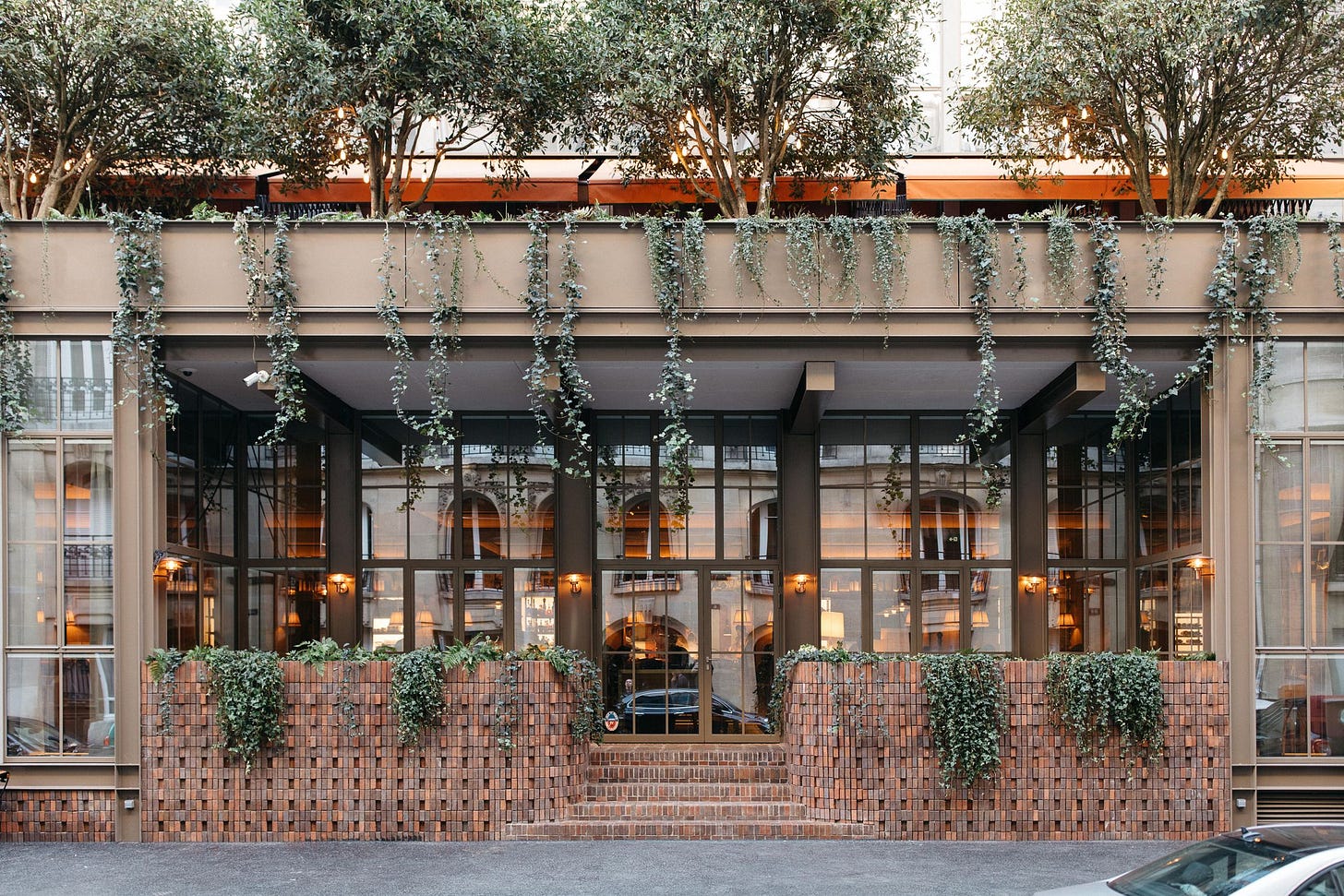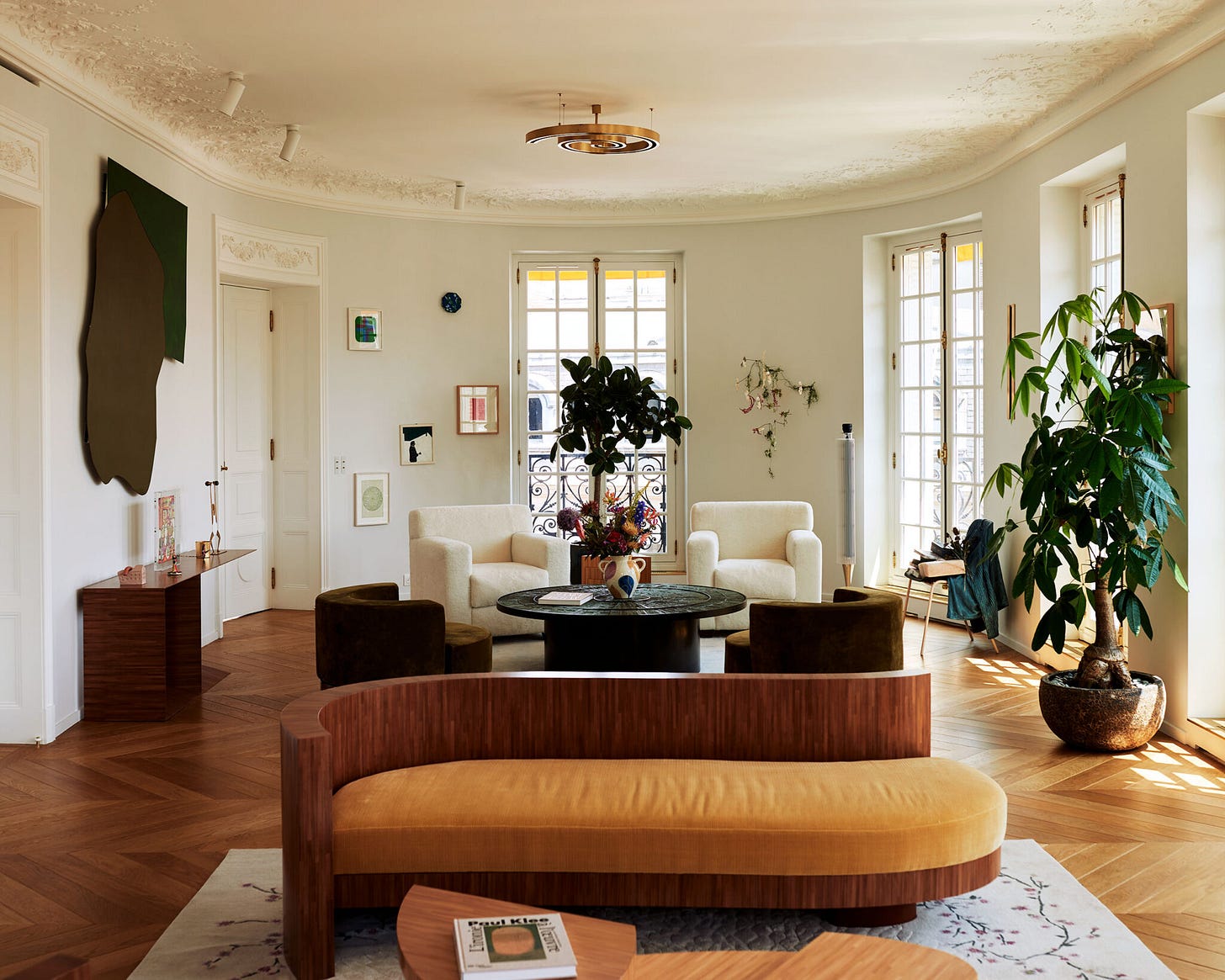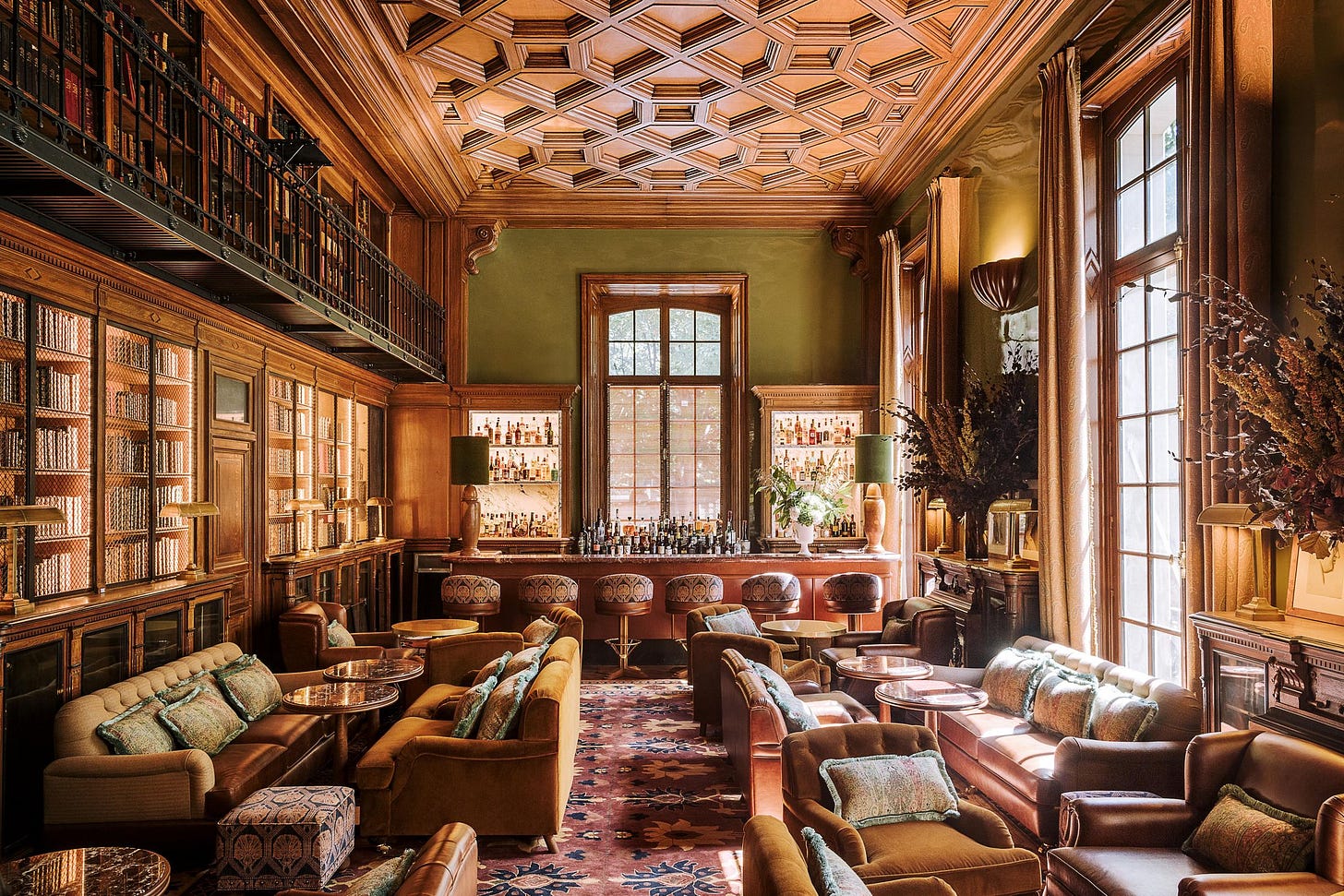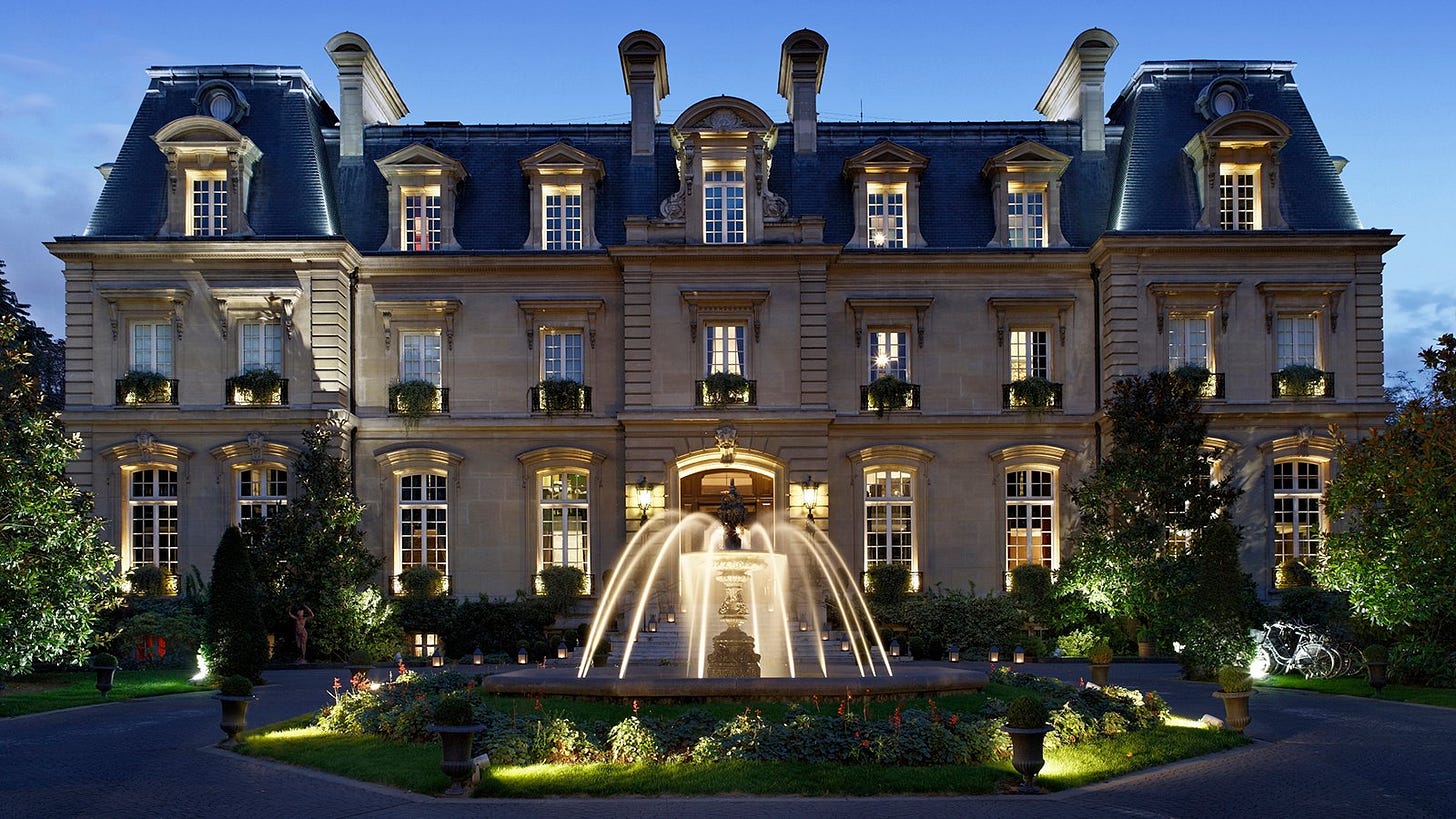Chapter Three: Helen in Paris
A New Challenger Approaches!
[FaceTime Incoming…]
Helen did not flinch when her phone chimed. Only one person ever placed an unannounced video call at this hour.
She answered from the velvet chaise, silk robe loosened at the collar. Freshly washed curls clung to her cheeks, skin still pink from a scalding shower. She looked decadent, like a Bengal tigress stretching beneath afternoon sun. Outside, Paris had barely begun to blink, pale light slipped between linen curtains and painted long stripes across the parquet.
Tyler filled the screen, shirtless, beaming, the neon skyline of Hong Kong blazing behind him.
“You seem to be enjoying yourself,” Helen teased.
“I might be in love.” Tyler glowed the way people do after three espresso martinis and questionable decisions.
“You say that every week.”
“This one is different. Older, established, built like brick house. British, yet surprisingly hilarious, and he loves Beyoncé. Tell me how to get pregnant immediately.”
Helen arched a brow. “London based?”
“Working in Hong Kong. But it’s giving ‘fly me to London just to walk down Mayfair holding hands.”
“You would go!”
“And I would! I don’t even need a bag. I’ll get clothes when I’m there.” Tyler exhaled like an actor reaching the punch‑line. “He has been lovebombing me. Gifts, late‑night voice notes, the entire arsenal.”
“I am screaming.”
“If I had known men liked my type of crazy I wouldn’t have tried half as hard in school to get here.”
Helen sipped her coffee. “And you like him?”
“I do, but he looks at me like he wants to eat me. It’s unnerving. I kind of like it.”
Helen nodded. “I know the look.” Their gazes held across oceans and cables. Two pyromaniacs comparing burns.
The conversation spun as only best friends allow: fast, overlapping, no exposition required. Men, art, obsessions, cities, each topic falling like silk scarves onto a polished floor. Helen ended the call and allowed the silence to resettle inside the apartment. Tyler alone understood how easy it was to be adored and how quickly adoration turned dull.
Men pursued. She evaluated. Most became footnotes.
Paris waited. She refused to.
A warm spring light angled across the stones of Rue de l’Abbaye, and Helen stepped into it as gracefully as a dancer breaking through stage curtains. The abbey bells had finished their midday toll. Anticipation lingered in the hush they left behind. She wore a pearl‑gray silk blouse that gleamed against her shoulders and a skirt the color of café crème. Damp curls framed her face, catching flecks of sunshine like strands of gold leaf.
At the florist on the corner, white lilac perfumed the street. Helen paused, inhaled, then glided toward Cafe Louise. A waiter in starched linen guided her to a terrace table beneath the vines. She ordered Sancerre, fries, and a chèvre‑chaud salad. Warm goat cheese soaked in honey turned velvety against crisp toast paired with the crunch of the crispy potato: it was the closest thing to heaven on a fork. While she ate, Saint‑Germain performed a matinee for her private enjoyment: grandmothers in sequined sunglasses exchanged state secrets, a courier threaded a bike through traffic, a teenager savored a solitary cigarette as if it contained the solution to every homework problem on earth. Helen tasted, observed, and let the district’s languid tempo dictate her mood.
When the plate was cleared, she drifted down to Maison Fleuret. Chandeliers shimmered against pistachio walls, pyramids of macarons rose like edible geodes. She selected rose, pistachio, and bitter chocolate, each one wrapped in tissue that matched the Mediterranean. Outside, a single macaron dissolved on her tongue, leaving almond and petals in its wake.
Diptyque beckoned a few doors away, the interior drenched in the scent of cedar and tuberose. She examined a candle called Feuille de Lavande, then one named Narcisse, but purchased the Pomander, imagining its sensual clove and orange peel curling through her apartment. The clerk slipped the jar into a cloth bag printed with black vines.
Farther along, a boutique window captured her reflection beside a midnight‑blue wrap dress draped on a mannequin. The silk resembled water imprisoned in fabric. Inside, she let the gown pool over her frame, marveling at the way it obeyed the command of her shoulders. Desire flickered, then cooled. Some luxuries pleased more when left behind. She returned the dress to its hanger and carried the memory instead.
Crossing Boulevard Saint‑Germain, she found L’Écume des Pages. Floorboards creaked like old ships. She traced spines until a novel beckoned, its cover showing sugar‑white sand and turquoise surf. Nearby, a slim Apollinaire volume in dove‑gray leather whispered possibilities. The poetry felt right. Book in hand, she stepped back into sunlight now mellow with late afternoon.
Café terraces filled with early diners, silverware chimed, motorbikes murmured at the curb. Saint‑Sulpice lions glowed rose gold as dusk rolled in. In Place Saint‑André‑des‑Arts she purchased sparkling water and a fresh squeezed jus d’orange.
Eight o’clock bells greeted her return to Rue de l’Abbaye. Upstairs, she undressed, choosing a black satin dress with a modest neckline that divulged its scandal in the back. A thin gold anklet hugged her ankle, a secret for any keen observer. She lit the pomander candle and read a page of poetry while its perfume blossomed. Streetlamps outside cast ellipses of honey on cobblestones, and her pulse quickened to meet them.
By quarter to nine she slipped into a cropped trench, Ladurée box and new book tucked in a slim clutch. She locked the door, exhaled, and let Paris breathe over her. Anticipation gathered like sequins in the dark.
Lafayette, 9 p.m.
Helen paused just inside the tall lacquered doors, eyes adjusting to the amber glow. Floor-to-ceiling bookcases lined every wall, volumes caged behind brass mesh. A balcony of wrought iron ran the room’s perimeter while a coffered cedar ceiling floated overhead like an enormous honeycomb. At the far end, the bar gleamed beneath twin niches of back-lit crystal decanters, each bottle catching the light like cut garnet. The whole space smelled of polished walnut, old paper, and something darker—clove, perhaps, lingered from a discreet diffuser.
Étienne rose from a cigar-toned club chair as though lifted by invisible strings. Every detail on him had been edited for symmetry: hair swept back in a strict wave, midnight suit crisp as a banknote, vintage De Bethune winking at his cuff. She caught cedar, lapsang, and the faint bite of bergamot when he leaned in to brush her cheek.
“You have made Lafayette even prettier,” he said, voice pitched for intimacy although they were the only guests. He gestured toward the seat opposite.
“Flattery before aperitif,” Helen replied. “Dangerous habit.”
“Observation, not flattery.” He signaled the barman, who produced a chilled bottle of Egly-Ouriet Blanc de Noirs. The cork surrendered with a sigh. Champagne slid into coupes, soft as silk against crystal. The first taste offered strawberry and toasted brioche. Helen let the bubbles linger before speaking.
“I hear your start-up closed another round,” she said, placing her clutch on the low marble table.
“True. Fifty million in fresh capital.” Étienne’s smile suggested he had expected the question. “Algorithmic efficiency is irresistible when shipping costs keep rising.”
“So romance still lives at the intersection of freight lanes and venture debt.” She raised a brow.
“It lives wherever there is margin.” He watched her sip again, studying the curve of her mouth the way a jeweler inspects a facet.
A waiter materialized with amuse-bouches: scallop crudo on gold spoons, brioche toast topped with trout roe that burst like sunrise on the tongue. Étienne described the chef’s foraged sea fennel. Helen countered with a note on overfishing in Brittany and its implications for luxury menus. Their sentences fenced elegantly, point and parry, each thrust polite yet sharpened.
Dinner unfolded beside the bar’s emerald walls. A salad of white asparagus and shaved truffle arrived first, then duck glazed with cassis, bones gilded for spectacle. Étienne recited the château where the birds had been raised. Helen considered whether the duck had ever envied swans.
Between courses he quizzed her about the moral architecture of Tarantino’s lesser films. She answered, then asked why he had such an insistent choice of language in all of his films, making him rather guache. His fork paused for a heartbeat. He offered a statistic about qualified candidates in machine-learning logistics. She responded with the titles of three female professors who supervised doctoral research on exactly that field. His smile tightened, polite yet preoccupied with recalculation.
Dessert appeared: a single orb of chocolate resting on spun caramel. Warm sauce melted the shell, revealing violet ice cream scented with Armagnac. Étienne watched her reaction, eyes bright with hypothesis. She tasted floral heat and childhood summers, yet felt only the tedium of someone measuring her delight in real time.
He leaned back. “Define happiness in a sentence.”
Helen traced condensation on her coupe. “Wind strong enough to ruin a perfect hair day.” She met his gaze. “Can your algorithm price that?”
A flicker crossed his face. Wry, conceding, almost intrigued, then it vanished. He signaled for espressos served in Limoges porcelain. He broke the single square of Guanaja chocolate and slid half onto her saucer with courtroom precision.
Outside, night pressed its velvet against the tall windows. Étienne offered his arm for the walk to reception. His presence hummed close but never touched. She sensed calculations updating behind his steady eyes.
At the porte-cochère he paused beneath a gas lamp that haloed the damp spring air. “I could show you the private cellar. Chartreuse from 1847. Few have tasted it.”
Temptation purred through the invitation, yet the promise felt archived, already catalogued. Helen imagined how he would watch her sip the rare liqueur, filing every expression under a folder titled “Controlled Variables.
“I prefer fresh air,” she said. “And I have an early morning.”
Something in his posture relaxed, almost grateful for the boundary. “Allow me at least to book your car.”
“I have my own,” Helen lied gently.
Étienne nodded. Discipline reasserted itself across his shoulders. “Another dinner soon. Perhaps the observatory at the Quai Branly. Or Girafe, if you prefer.”
“That view deserves consideration,” she answered, stepping back into the mist. “Thank you for tonight.”
He bowed, formal yet undefeated, and receded into Lafayette’s golden doorway. She turned toward the gates, satin dress whispering across her thighs, champagne breathing soft lightning in her veins. Behind her the library bar glowed like a jewel box: beautiful, curated, expensive, and entirely too safe.
Helen wanted combustion, not choreography. The city waited past the hotel gardens where lilac and diesel mingled in the damp. She walked faster, craving the first unexpected spark.
Rue de l’Abbaye, 11 p.m.
The apartment greeted her in shades of indigo, a watercolor that had lost patience with its own edges. She removed her heels, lit a beeswax taper, and watched copper light skate across the antique mirror. Dust motes drifted like shy confetti.
At the desk by the window she opened her journal. Linen‑scented pages waited. Her fountain pen flowed.
“Étienne is kind, intelligent, wealthy, and unutterably dull.” She underlined the final word until the nib almost pierced the paper. Relief unfurled.
Another sentence followed. “He is a navy sweater, correct and forgettable. I crave curiosity, surprise, a lover who can make me forget my own wardrobe.”
The phone buzzed. FaceTime: Dior ❤️. Helen hesitated, then answered.
Dior lounged in candlelight, bare‑faced, loose hair, a glass of chilled Burgundy in hand, jazz murmuring somewhere nearby.
“Did you fall in love or regain your senses?” Dior asked.
“Neither. He was flawless and, therefore, dull.”
“And still you look too good in that slip.”
“I grew tired of explaining myself.”
“Never explain. Mystery pays dividends,” Dior crooned, her eyes sharp despite the velvet tone. “Did he truly see you or simply label you?”
Helen recalled his forensic attention. “He listened only to respond.”
“Exactly. You desire discovery, not confirmation.” Dior lifted her glass. “Take the dinner at Girafe next week, wear black, order dessert. Enjoy him, do not invest.”
They exchanged more sisterly wisdom until another call summoned Dior away. Helen returned to her journal and wrote, Every man is an experience. I am the memory by which they measure the rest.
She pinched out the flame and let the room fall into velvet darkness. Paris exhaled beneath the window, yet her thoughts glowed bright, keeping their own midnight vigil.

